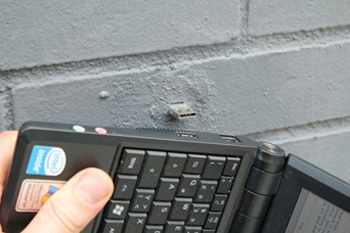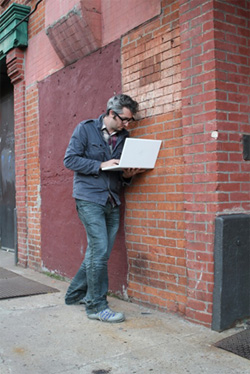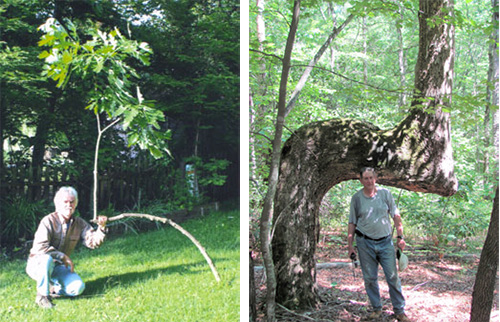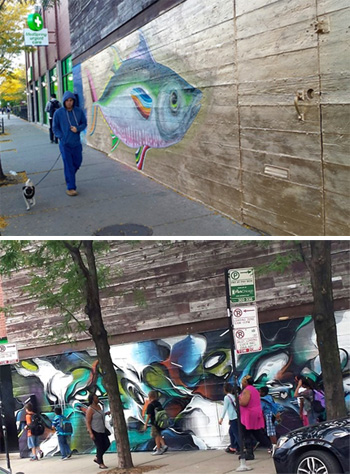5 Cool Secret Codes Hiding In Plain Sight Around The World

You can find Easter eggs everywhere -- hidden in DVD menus, tucked away in video games ... heck, we've even heard that, for one day a year, the Easter eggs are actual eggs hidden in the real world. Bizarre, right? But if you can't wait for that day (or if you have no interest in collecting ground eggs), there are other, far better secrets hidden all around you. Like ...
USB Dead Drops Hide A Secret Information Network

"Dead dropping" is a practice wherein tech-savvy hipsters glue USB ports onto public spaces, like walls and bridges, for random people to stumble across and dig into.

Flash drives withstand multiple coats of hobo pee.
To many, the idea of whipping out your laptop and plugging in a random thumb drive you found in an alleyway sounds like a terrible idea -- it's basically the digital equivalent of a glory hole. But for those who spend time hunting for dead drops, it sounds like a wonderful idea -- like the digital equivalent of a glory hole!

The chance of getting a dick pic is approximately 100 percent.
The idea is the brainchild of Aram Bartholl of EYEBEAM, an experimental tech agency combining art with modern computing technology. Bartholl was inspired by the Cold War-era espionage technique of hiding sensitive information in plain sight -- say, behind a loose brick or under a creaky floorboard.
But what presumably started as an overkill way for Bartholl to hide his pornography has since blossomed into a global trend, with at least 1,500 known installations around the world, featuring anything from cute cat pictures to recipes to instructions on how to build bombs.

And actual bombs, maybe.
As far as we're aware, no horrific viruses have spread through the project, but there have been enough terrorist manifestos and crystal meth recipes to draw the attention of police.
Uh ... nobody tell the police about the internet. They'd have a fit.
Native American Trail Trees Hidden In The Forests

Before GPS technology gently guided us into the ocean instead of our intended destination, Native Americans needed to navigate the wilderness. So they marked their walking trails with saplings, tying them down in such a way that the trunks were forced to grow into specific patterns.

It took decades. They ... didn't have much to do back then.
Many of these "trail trees" are still out there in the American wild, although the trails that they originally marked haven't been used for hundreds of years. Luckily, some hobbyists have taken to rediscovering these trails by identifying the markers and recording their locations, because some freaks like to spend their time exploring history and nature instead of the depths of their own depravity, like we do.

Though come to think of it, we can think of a couple depraved things to do to that tree.
Somewhere around 2,000 trail trees have been recorded across 40 states and Canada. So if you're ever taking a stroll through the forests of North America and come upon an unnaturally bent tree, it's possible you've stumbled on a thousand-year-old marker of historic value. Or it's just a weird tree! It all depends on how interesting you want to pretend your life is.
The Giant Concrete Arrows Scattered All Across The U.S.

If you ever find yourself stranded in the American desert without food or water, and you come across a crumbling concrete arrow half buried in the dirt, you might think you've been saved.

"Clearly, this leads to a KFC!"
The bad news is that you're probably still going to die. But the good news is that you stumbled on a valuable piece of American history! ... right before you died.
Here's the story: Fewer than 20 years after the Wright Brothers' historic flight, the U.S. Postal Service was already using planes to shorten cross-country mail delivery times from weeks to days. The problem was that, in those early days, pilots had no idea how to navigate in the air. The Postal Service addressed this problem by covering the landscape in giant arrows. At the time, the arrows were painted bright yellow and accompanied by tall beacon towers to facilitate navigation at night.

It was way better than the first plan, which involved setting whole cities on fire.
In 1929, the network stretched from San Francisco to New York, and at its zenith included over 1,500 beacons, spaced about 10 miles apart over 18,000 miles of land. Eventually, the system was abandoned in favor of much more practical radio guidance technology. Now that ground-based navigation was no longer necessary, the arrows fell into disuse, and when World War II rolled around, the beacon towers were knocked down because the military needed the metal to fight Hitler. Now, all that remain are the concrete arrows.

Concrete was useless against Hitler's Nazibots.
If you know where to look, you can still find the sun-bleached arrows stretched along the barren desert landscape pointing in a straight line from coast to coast, like a futile video game quest with no reward. Well, unless you consider "the journey itself" to be the reward. In which case, oh my god shut up.
Secret Bars Exist All Over The World

Prohibition is long dead, but it left Americans with one valuable lesson: Drinking in secret is super fun. In Long Beach, California, the Parlour Lounge can only be located via a secret door in the back of another, more publicly accessible bar. Even cooler: The lounge is inside a derelict bank vault, and you can only enter if you know the password.

"Speak friend, and enter."
In Phoenix, if you know which filthy industrial corridor to walk down without stumbling onto a hobo fight club, you can find Melinda's Alley, distinguished only by a single red light over an unmarked door.

And the uh ... the crowds of people milling about.
The Violet Hour in Chicago is only given away by the single unobtrusive door handle. "Where does this door lead?" passersby are meant to wonder. "To adventure? To kidnappers who can't believe this keeps working? Only one way to know!"

Like a gateway to Barnia.
New York's Please Don't Tell can only be accessed through a decorative old-timey phone booth in Crif Dogs, a local hot doggery.

That stuff on the floor could be alco-puke or relish.
Even cooler: You use the phone to access the secret entrance. You're like a secret agent of gettin' drunk!

Like James Bond, except you drink!
... Wait.
If you're in Culver City, California, you can drop into the Blind Barber, a bar hidden through the back door of a barber shop.

A great place to get hair of dog.
Finally there's the Flask Bar in Shanghai, China, which is hidden inside a vintage Coke machine in the back of a sandwich shop.

If you give the wrong password, you get Pepsi.
It's like a corporate TARDIS! But if you step inside and meet a man who only refers to himself as "The Doctor," maybe don't follow him anywhere without leaving a note first.
Many Of The Buildings In Your City Could Be Fakes

Many of the buildings you pass on your way to work each day aren't real. No, we're not referring to the theory that all of life is a big game of Sims for procrastinating aliens. We mean they're actually fake. Take Leinster Gardens in London, pictured above, where you can find a completely ordinary row of apartments. Move around back, though, and you'll find the entire thing is a false front. It's not even a building; merely a decorated wall hiding a subterranean railway tube.

Because Platform 9 3/4 simply isn't discreet enough.
It's also common practice to disguise utility buildings as homes. Take this house on Wade Avenue in Raleigh, North Carolina. It is in fact a government water-pumping station.

"Water, not brainmelt juice, we swear."
In Detroit, Minneapolis, Cincinnati, and many other cities, boarded-up houses that served as derelict crack dens aren't renovated -- they're just painted over to cleverly give the impression of happily inhabited homes.


Ironically tripling the chance of burglary.
Sometimes, fake buildings are erected to cover embarrassing secrets. Ahead of the 2013 G8 summit in Ireland, the country diverted 300,000 pounds from its faltering economy to hide the encroaching urban desolation. In Fermanagh county, a number of recession-hit shops were painted over to give visiting world leaders the impression that the local economy was booming.

In Antrim county, dozens of derelict storefronts received deceptively sprightly facades, displaying shiny wares and even fake shoppers to complete the illusion of a bustling city center:

Dwarfs were tastefully dressed in green and carried sacks of gold.
So in a nutshell: The whole world is lying to you, never trust what you see, and always try strange unmarked doors in case there's something cool behind them. But don't tell the cops you heard that here.
For more real-world Easter eggs, check out Crazy Secret Places Hidden In The Middle Of Famous Locations and 6 Massive Secret Operations That Are Hidden All Around You.
Subscribe to our YouTube channel, and check out 6 Movie Easter Eggs You Missed (If You Only Speak English), and other videos you won't see on the site!
Also, follow us on Facebook, and we'll follow you everywhere.
